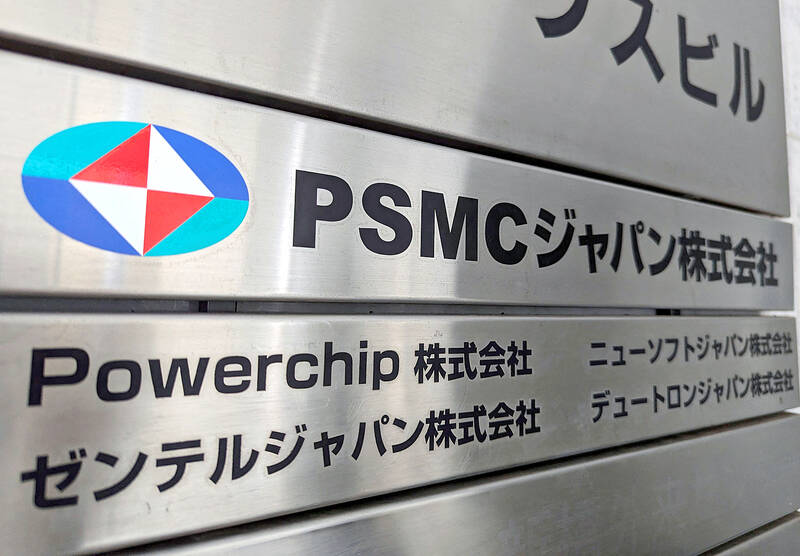Powerchip Semiconductor Manufacturing Corp (力積電) plans to build an ¥800 billion (US$5.3 billion) factory in northeast Japan with financing from investment group SBI Holdings Inc and the Japanese government, the latest boost to the nation’s bid to expand its chip manufacturing base.
The factory would require an initial investment of ¥420 billion, of which Powerchip and SBI would pay more than half, the firms said.
The rest would come from investors, bank loans and government subsidies, they said.

Photo: Reuters
The foundry, to be built in Miyagi Prefecture, is to produce mature 40-nanometer and 55-nanometer semiconductors, focusing on automotive chips and power controllers, and is to go online in 2027, the companies said.
Japan, home to Toyota Motor Corp and Honda Motor Co, is a heavy user of such chips, produced by the likes of Tokyo-based Renesas Electronics Corp.
“We’ve made preparations to create an unbeatable foundry and build a semiconductor ecosystem,” SBI chief executive officer Yoshitaka Kitao told a news conference yesterday.
SBI is to pay about ¥100 billion of the initial investment and seek another ¥100 billion through a new fund it plans to set up, but will not build a foundry without subsidies, Kitao said.
Japanese Prime Minister Fumio Kishida’s administration is paying billions of dollars in subsidies to chipmakers moving production to Japan.
Spurred by the financial support, Powerchip’s bigger rival and industry leader Taiwan Semiconductor Manufacturing Co (台積電) is building a factory in southern Japan, with operations expected to begin next year.
US memorychip maker Micron Technology Inc, and domestic players Kioxia Holdings Corp and Rapidus Corp are also expanding production in the world’s third-largest economy, helped by government support.
“The automotive chips that Powerchip will focus on are precisely the kind of chips used in vehicles today and will help secure this production base,” Japanese Minister of Economy, Trade and Industry Yasutoshi Nishimura said at a regular news conference ahead of the investment announcement.
“We want to secure the supplementary budget necessary to strengthen our semiconductor supply chain,” Nishimura added.
Japan, which wants to claw back its former leadership in chips, is benefiting from a shift in global supply chains as manufacturers seek to lower reliance on Taiwan and hedge against rising US-China tensions.
Washington is also offering incentives to chipmakers building capacity in the US, but progress has been slow.
Japan is “the best place” for semiconductor investment, Powerchip chairman Frank Huang (黃崇仁) said.
With so much capacity coming online in Japan, it remains unclear how companies would be able to secure enough engineering talent, given a weak yen.
Powerchip’s move comes as the chip sector fights to regain its footing from a sharp drop in demand following the COVID-19 pandemic.
The Taiwanese contract chipmaker had a tough first half, with little profit due to weak sales.
It reportedly told investors in July that it would be conservative with capacity expansion going forward.

MULTIFACETED: A task force has analyzed possible scenarios and created responses to assist domestic industries in dealing with US tariffs, the economics minister said The Executive Yuan is tomorrow to announce countermeasures to US President Donald Trump’s planned reciprocal tariffs, although the details of the plan would not be made public until Monday next week, Minister of Economic Affairs J.W. Kuo (郭智輝) said yesterday. The Cabinet established an economic and trade task force in November last year to deal with US trade and tariff related issues, Kuo told reporters outside the legislature in Taipei. The task force has been analyzing and evaluating all kinds of scenarios to identify suitable responses and determine how best to assist domestic industries in managing the effects of Trump’s tariffs, he

TIGHT-LIPPED: UMC said it had no merger plans at the moment, after Nikkei Asia reported that the firm and GlobalFoundries were considering restarting merger talks United Microelectronics Corp (UMC, 聯電), the world’s No. 4 contract chipmaker, yesterday launched a new US$5 billion 12-inch chip factory in Singapore as part of its latest effort to diversify its manufacturing footprint amid growing geopolitical risks. The new factory, adjacent to UMC’s existing Singapore fab in the Pasir Res Wafer Fab Park, is scheduled to enter volume production next year, utilizing mature 22-nanometer and 28-nanometer process technologies, UMC said in a statement. The company plans to invest US$5 billion during the first phase of the new fab, which would have an installed capacity of 30,000 12-inch wafers per month, it said. The

Taiwan’s official purchasing managers’ index (PMI) last month rose 0.2 percentage points to 54.2, in a second consecutive month of expansion, thanks to front-loading demand intended to avoid potential US tariff hikes, the Chung-Hua Institution for Economic Research (CIER, 中華經濟研究院) said yesterday. While short-term demand appeared robust, uncertainties rose due to US President Donald Trump’s unpredictable trade policy, CIER president Lien Hsien-ming (連賢明) told a news conference in Taipei. Taiwan’s economy this year would be characterized by high-level fluctuations and the volatility would be wilder than most expect, Lien said Demand for electronics, particularly semiconductors, continues to benefit from US technology giants’ effort

‘SWASTICAR’: Tesla CEO Elon Musk’s close association with Donald Trump has prompted opponents to brand him a ‘Nazi’ and resulted in a dramatic drop in sales Demonstrators descended on Tesla Inc dealerships across the US, and in Europe and Canada on Saturday to protest company chief Elon Musk, who has amassed extraordinary power as a top adviser to US President Donald Trump. Waving signs with messages such as “Musk is stealing our money” and “Reclaim our country,” the protests largely took place peacefully following fiery episodes of vandalism on Tesla vehicles, dealerships and other facilities in recent weeks that US officials have denounced as terrorism. Hundreds rallied on Saturday outside the Tesla dealership in Manhattan. Some blasted Musk, the world’s richest man, while others demanded the shuttering of his